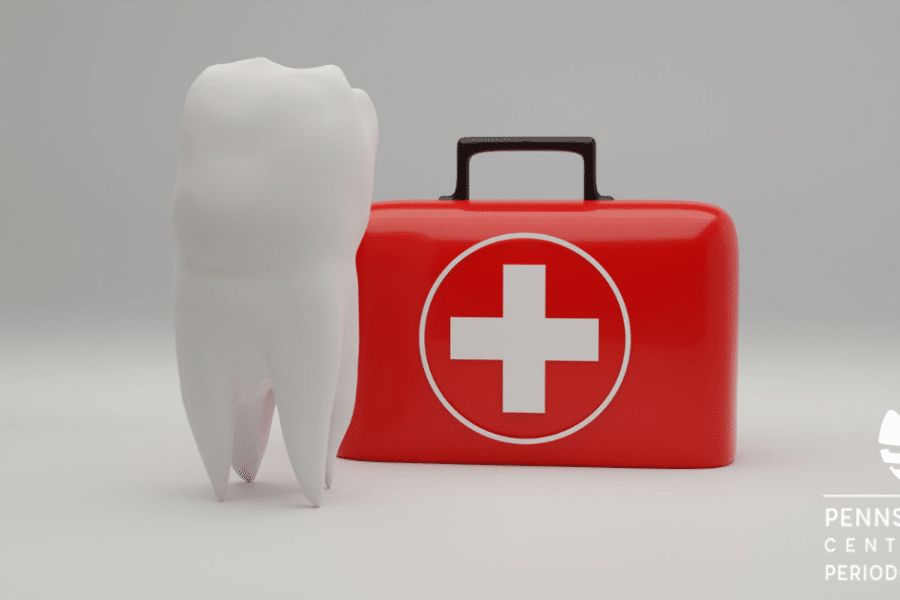If you are experiencing pain, swelling, or bleeding in your mouth and not sure why you may have a dental emergency that requires prompt attention. Some periodontal emergencies are urgent and require immediate care while others can wait for a scheduled appointment.
In the periodontal office, dental emergencies usually involve your gums more than teeth. However, since the two go hand in hand, it can be difficult to decide whether to call your dentist or periodontist for care.
To help guide you through dental discomfort, we have listed some common periodontal emergencies and whether they require urgent care or a scheduled evaluation.
What are common periodontal emergencies?
Common periodontal emergencies involve gum swelling, severe mouth pain, difficulty brushing, or eating due to pain, unexplained bleeding, and loose teeth. Trauma due to injury to the mouth can also be periodontally involved when gums have been injured.
Here are some helpful guide questions to help you get the care you need:
Do you have gum swelling?
Gum swelling with or without pain can indicate a severe mouth infection. If that swelling is mild, you may need a periodontal evaluation for its cause. But if that swelling is severe or extends to your face, it is considered severe and needs immediate attention.
Some causes of gum swelling are:
- Gingival Abscess – a swelling that occurs when something foreign gets stuck under your gums. One common culprit of a gingival abscess is something like a popcorn kernel. Typically, it will work itself out on its own. But if the swelling continues or worsens, you should be evaluated with a scheduled appointment.
- Periodontal Abscess – a swelling that occurs when patients have severe periodontal disease with an active infection that requires prompt attention. If the area is in the mouth only without pain, you can call the office for an appointment. However, if the swelling has spread to your face and you’re are experiencing pain, you have a severe infection that requires immediate attention.
- Pericoronitis – inflammation around the gum tissue surrounding a partially erupted tooth. While this inflammation is usually mild and can resolve on its own with proper oral home care, it can become severe if you experience severe pain and face swelling and will require immediate attention.
Do you have mouth bleeding?
Bleeding gums are common but not normal because healthy gums should never bleed. While bleeding gums require a dental evaluation, most cases do not require emergency attention. However, if you have had a recent injury, dental surgery, or prolonged and severe mouth bleeding for an unknown reason, you need to call for immediate attention to stop the bleeding.
Do you have pain?
Common dental problems come with some level of pain. In fact, cold sensitivity is common in periodontal patients. The extend of your pain determines whether you have a dental emergency or a problem that just requires a scheduled evaluation.
If you have pain, you can take over-the-counter pain relievers at home until your appointment. If your pain is severe, throbbing, or does not minimize with over-the-counter pain relievers, you need to call to be seen immediately.
Are your teeth loose?
Loose teeth can happen for several reasons such as injury and periodontal disease.
If you have had an injury to a tooth such as biting down hard or bumping a tooth inadvertently, you may have caused a temporary inflammation to the ligaments that support your teeth. The ligaments usually heal on their own without medical attention. However, if the tooth movement continues for more than one week or is associated with swelling or pain, you should schedule an evaluation appointment.
Typically, periodontal disease progresses slowly so you will notice a slow progression in tooth mobility. However, if you have a serious periodontal abscess, the infection will cause swelling that will worsen the feel of tooth mobility more noticeably.
So, if your teeth have been progressively becoming loose, you should schedule a complete periodontal evaluation. But if your teeth suddenly become loose and have pain or swelling, you need to seek immediate attention.
Have you had a dental injury/trauma?
If you have fallen and injured your mouth, you may need to see your dentist immediately especially if your teeth are loose or you have bleeding and swelling. Sometimes, injuries can wait for a next-day appointment while others may require an emergency visit. Either way, you should call your dentist immediately after the injury for advice because some oral injuries can be serious without symptoms.
If you have injured a tooth and it is severely loose or has been knocked out, you need to contact us immediately for care!
It is important for you to know that mild dental pain or inflammation can lead to more severe issues that may require emergency care. The best way to avoid emergencies is to make sure to keep your regularly scheduled appointments and report any issues to your dental professionals.
